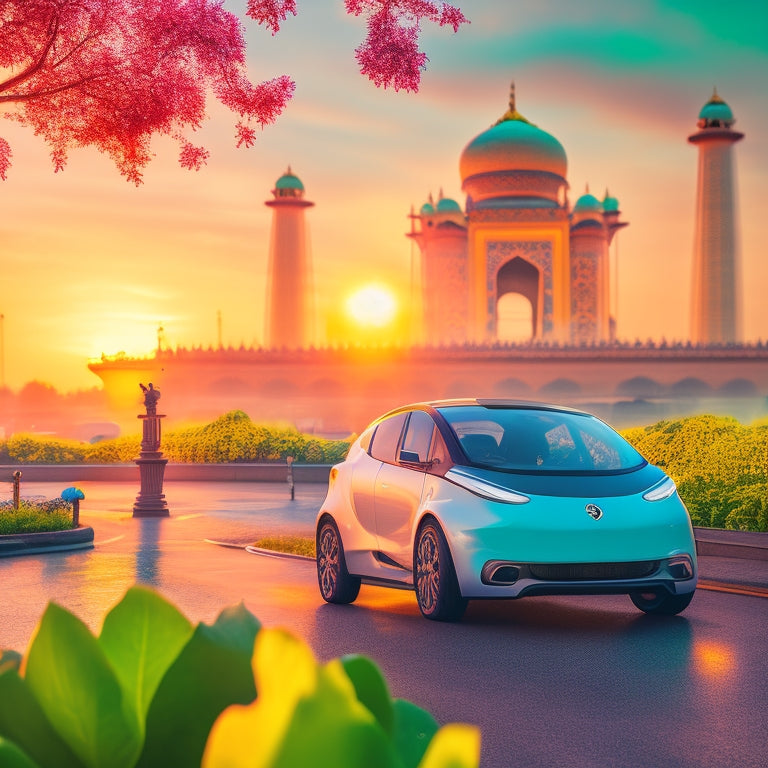
Revolutionizing India's Electric Vehicle Market: Insights Unveiled
Share
India's electric vehicle (EV) market is poised for remarkable growth, with EVs expected to constitute over 40% of the country's automotive market by 2030, driven primarily by the two-wheeler segment. By 2030, EV sales are projected to grow eightfold. To achieve this, strategic interventions in product development, go-to-market strategies, and customer segment prioritization are essential. Scaling up charging infrastructure and software development are also key focus areas. A multifaceted approach, including prioritizing fleet electrification, addressing range anxiety, and enhancing customer experience through software integration, is necessary to accelerate EV adoption, and exploring these factors in depth can uncover further opportunities for growth.
Key Takeaways
• India's EV market is expected to grow exponentially, with EVs constituting over 40% of the automotive market by 2030.
• Strategic interventions in product development, charging infrastructure, and customer segmentation are crucial for growth.
• A multifaceted approach, including fleet electrification and software integration, is necessary to address high upfront costs and range anxiety.
• Policy revisions, such as changes to the FAME scheme, significantly impact EV penetration, particularly in the two-wheeler segment.
• Addressing range anxiety and enhancing customer experience are key opportunities for growth in the Indian EV market.
India's EV Market Overview
By 2030, electric vehicles (EVs) are poised to constitute over 40% of India's automotive market, with the majority of EV sales currently dominated by the two-wheeler (2W) category, followed by four-wheeler (4W) and three-wheeler (3W) segments.
This growth is driven by favorable market trends, with EV penetration expected to grow 8x by 2030. The policy landscape has also played a significant role, with revisions to the FAME scheme impacting 2W EV penetration and 3W and 4W EVs witnessing growth.
However, challenges persist, including high pricing, range anxiety, limited charging infrastructure, and financing friction.
Understanding these market trends and the policy landscape is essential for stakeholders to navigate the Indian EV market effectively.
Focus Areas for Growth
To propel India's electric vehicle market forward, strategic interventions are necessary across product development, go-to-market strategies, customer segment prioritization, software development, and charging infrastructure.
Focus areas for growth include product innovation, specifically developing entry-level models that cater to Indian customers' needs.
Effective customer segmentation is vital, prioritizing B2B and fleet segments for near-term growth.
OEMs must reimagine distribution models and scale up charging infrastructure to reduce range anxiety.
Interventions require category-specific stakeholder action, and OEMs must develop native software capabilities to enhance profitability and customer experience.
Revving Up EV Adoption
As the Indian electric vehicle market gears up to achieve its ambitious targets, accelerating EV adoption requires a multifaceted approach that addresses prevailing pain points, including high upfront costs, limited charging infrastructure, and range anxiety. To rev up EV adoption, prioritizing fleet electrification and charging solutions can help alleviate these concerns. Moreover, software integration can enhance customer experience, making EVs a more viable option for consumers.
| Strategy | Impact |
|---|---|
| Fleet Electrification | Reduces upfront costs, increases adoption |
| Charging Solutions | Mitigates range anxiety, boosts infrastructure |
| Software Integration | Enhances customer experience, increases loyalty |
| Customer Education | Increases adoption, reduces anxiety |
Frequently Asked Questions
How Will India's EV Market Compete With Established Automotive Manufacturers?
India's EV market will compete with established automotive manufacturers by focusing on market share growth through brand loyalty, driven by customer-centric products, superior after-sales service, and strategic partnerships to enhance brand reputation and customer retention.
What Role Will Battery Recycling Play in India's EV Ecosystem?
Battery recycling will play a pivotal role in India's EV ecosystem, enabling closed-loop production and minimizing waste, with an estimated 10% reduction in battery costs, and 20% decrease in greenhouse gas emissions by 2030.
Can India's EV Industry Learn From Other Countries' Successful Adoption Strategies?
India's EV industry can learn from successful adoption strategies abroad, leveraging government incentives, public awareness campaigns, tax benefits, foreign partnerships, and regulatory frameworks to accelerate growth, as seen in countries like Norway and the Netherlands.
How Will EVS Impact Traditional Automotive Job Roles and Workforces?
As India's EV market accelerates, traditional automotive job roles face disruption; however, strategic upskilling initiatives, reskilling programs, and workforce diversification can mitigate the impact, ensuring job retention and fostering a resilient workforce.
Will India's Rural Areas Be Prioritized in EV Infrastructure Development Plans?
Rural areas may not be prioritized in EV infrastructure development plans, despite potential benefits from rural incentives and village charging initiatives, due to existing infrastructure and resource allocation challenges.
Related Posts
-

Smart Energy: Greener Homes With Connected Power Devices
You can control and optimize your energy consumption with smart energy devices, reducing your carbon footprint by up ...
-

Why Grow Up? Vertical Gardens Transform Urban Living
As you change your urban living space, you're not just growing up - you're bringing nature back into the heart of the...
-

What Water-Saving Gardens Complement Electric Vehicle Ownership?
As you pair your electric vehicle with a water-saving garden, you're not only reducing your carbon footprint but also...


